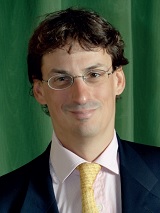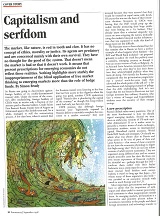When you leave university with a first in Classics and an unfinished PhD on Ovid’s ‘Amores Book III’ behind you, it’s not completely obvious what you should do next. Temping in the mailroom of a little company called Euromoney seemed as good a way to pay the rent as any, but had it not been for the 1987 crash, and a resulting staff cull, none of the rest of this would have happened.
|
|
I had already been given my marching orders when I was plucked from my last day in the basement on a moment’s notice to go to Denmark to interview the chairman of a company advertising intelligent buildings. It turned out those buildings were a lot smarter than me.
A muddle with a battery-powered microphone (who knew it even had a battery?) ensured that no record of the interview existed and I had to write it from memory.
This was made all the more difficult by the fact that I hadn’t understood anything he said – it was all about bonds and swaps and autonomous elevators. The 10-year journey to the editor’s chair had begun.
Padraic Fallon, former editor and by now chairman of Euromoney, made me editor on April 1, 1998.
It is almost impossible to describe the feeling of editing a magazine in an era that it is hard now to imagine. Finance was the rock ‘n’ roll of the age – fast-growing, freewheeling, glamorous and respected.
Euromoney has always had extraordinary and unique access to the most senior financial and political figures of each era. But this, pre-crisis, was a time of boundless optimism: walls were falling, countries were being born or reborn and democracy and capitalism were winning. And we were at the centre of it all.
Those times, and the emergence of new products, markets and institutions, are best summed up for me by a story I wrote as editor in 1998. It is essentially the chronicle of a long trip, funded by Turkish brokerage Global Securities and Bear Stearns, to introduce an eclectic group of investors to opportunities in central Asia. I was the only embedded journalist.
Hedge funds back then were new and exotic but nothing like as new and exotic as the equity markets of Tashkent, the privatization opportunities in Bishkek or the belly dancing in the Baku caravanserai.
Visit these places now and they have changed beyond all recognition. Back then they were still the crumbling gateways to the ancient myth we wanted them to be.
Much of what happened on that trip must, regrettably, stay unpublished, but you can read the redacted version.
I remember running out of cash and being chucked a wad of dollars that would have embarrassed Floyd Mayweather by the man from Bear Stearns.
I remember a club above a supermarket in Tashkent that made Mayfair club Annabel’s seem like a Rotary Club dinner dance. And I remember advising strongly, that in the president of Azerbaijan’s private but decrepit Tupolev Tu-104, we should definitely allow the pilot to swig from the litre bottle of vodka he had been brought on a tray, because who wanted to be with him on his first sober landing for 30 years? I like to think it remains a valid record of a time when the last cowboys could still just about jump the fences now carving up their wilderness.
Ultimately the story was about the hubris of western capitalism and the arrogance of the assumption that our banking system and capital markets were on the side of righteousness. I like to think it was true then and has stood the test of time.
Later of course it became clear that not all was well in the house of banking; the failure of what we had seen as valuable innovation would end up reversing much of the previous progress. But that was for another editor; in 1999, I moved into the managing director’s seat and started worrying more about money and less about the story.
Ultimately, however, editing Euromoney was about working with a special set of people. Neil Osborn greeted my first efforts at a feature with the words: “You’re not writing fucking PhD theses now.” My early mentor Paul King, sadly long deceased, taught me what a journalist really was. Sir Patrick Sergeant, without whom there would be no Euromoney, taught me about confidence, about asking hard questions politely and how to drink champagne in pints from pewter tankards.
Padraic Fallon, whose early passing changed everything, was charisma incarnate, the life force behind the company and magazine, and the source of our drive and self-belief.
As a teenager I walked past the offices of the Surrey Comet in Redhill and dreamed of becoming a journalist. (Editing) Euromoney delivered that dream and more – a life that no one has the right to expect, experiences that only my companions of the time can relate to or even believe. We bit the day to the core. I recommend it.
Simon Brady was editor of Euromoney from 1998 to 1999 and managing director from 1999 to 2010. He currently splits his time between content creation businesses in cybersecurity, digital transformation, wholesale banking, financial markets and next generation corporate treasury.






